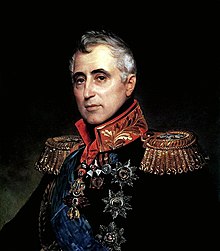Pozzo di Borgo
|
His Excellency Carlo Andrea Pozzo di Borgo |
|
|---|---|

Portrait of Count C. A. Pozzo di Borgo by Karl Bryullov (1833—1835)
|
|
| Russia Ambassador to the United Kingdom | |
|
In office 5 January 1835 – 26 December 1839 |
|
| Monarch | Nicholas I |
| Preceded by | Pavel Medem |
| Succeeded by | Nikolay Kiselyov |
| Russia Ambassador to France | |
|
In office 1 April 1814 – 5 January 1835 |
|
| Monarch |
Alexander I, Nicholas I |
| Preceded by | Alexander Kurakin |
| Succeeded by | Peter Palen |
| Prime Minister of the Kingdom of Corsica | |
|
In office 17 June 1794 – 19 October 1796 |
|
| Monarch | George III |
| Preceded by | Pasquale Paoli |
| Succeeded by | Office abolished |
| Member of the French Legislative Assembly | |
|
In office 1 October 1791 – 20 September 1792 |
|
| Constituency | Corse-du-Sud |
| Member of the French Constituent Assembly | |
|
In office 9 July 1789 – 1 October 1791 |
|
| Constituency | Corse-du-Sud |
|
Member of the Estates-General for the Third Estate |
|
|
In office 5 May 1789 – 9 July 1789 |
|
| Constituency | Corse-du-Sud |
| Personal details | |
| Born |
8 March 1764 Alata, Corsica |
| Died | 15 February 1842 (aged 77) Paris, France |
| Nationality |
French Russian |
| Political party |
Monarchien (1789–1791) Feuillant (1791–1792) Legitimist (1792–1804) |
| Alma mater | University of Pisa |
| Profession | Diplomat, soldier |
| Religion | Roman Catholicism |
| Military service | |
| Allegiance |
|
| Service/branch |
French Army Corsican Army |
| Years of service | 1792–1796 |
| Rank | Lieutenant general |
| Unit | Colonna-Cesari Regiment |
| Battles/wars |
|
Count Carlo Andrea Pozzo di Borgo (French: Charles-André Pozzo di Borgo, Russian: Карл Осипович Поццо ди Борго, Karl Osipovich Pozzo di Borgo; 8 March 1764 – 15 February 1842), was a Corsican politician who became a Russian diplomat.
He was born at Alata, near Ajaccio, of a noble Corsican family, four years before the island became a French possession. He was educated at Pisa, and in early life was closely associated with Napoleon and Joseph Bonaparte, the two families at that time being close political allies. Pozzo was one of two delegates sent to the National Assembly in Paris to demand the political incorporation of Corsica into France, and was subsequently one of the Corsican deputies to the Legislative Assembly, where he sat on the benches of the right until the events of August 1792.
On his safe return to Corsica he was warmly received by Pasquale Paoli, but found himself in opposition to the Bonaparte brothers who belonged to a different Corsican clan (and one he detested) who were now veering towards the Jacobin party. Under the new constitution Pozzo was elected procureur-general-syndic, that is, chief of the civil government, while Paoli commanded the army. Along with Paoli, he refused to obey a summons to the bar of the Convention, and the final breach with the Bonapartes, who actively supported the revolutionary authorities, dates from this time. Eventually Paoli and Pozzo accepted foreign help, and from 1794 to 1796, during the British protectorate of Corsica, Pozzo was president of the council of state under Sir Gilbert Eliott.
When Napoleon sent troops to occupy the island Pozzo was excepted from the general amnesty, and took refuge in Rome, but the French authorities demanded his expulsion, and gave orders for his arrest in northern Italy. After a short stay in London he accompanied in 1798 Sir Gilbert (now Gilbert Eliott, 1st Earl of Minto) on an embassy to Vienna, where he lived for six years and was well received in political circles. His hatred of Napoleon dominated his life, and even as an exile of no official standing he was recognized as a dangerous enemy.
...
Wikipedia
